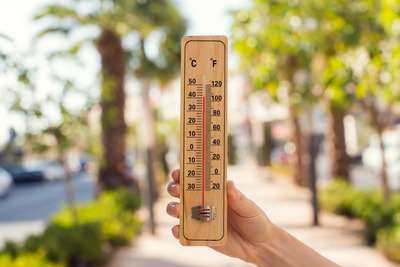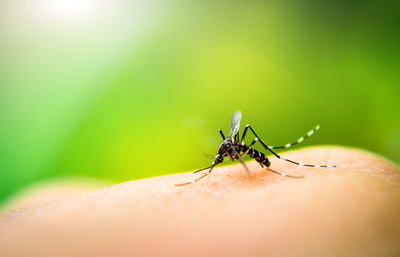7 Ways Heat Impacts Health
Story by:
Published Date
Article Content
While we often welcome the warm sunshine as summer rolls in, extreme heat can pose serious threats to the region, its landscape and our daily lives. As climate change continues to drive temperatures higher, understanding the impact of heat on health has never been more critical.
At UC San Diego, researchers across disciplines are at the forefront of investigating how heat affects our well-being, uncovering innovative insights to help combat these new challenges. Extreme heat, which is recognized as a prolonged period of high heat when temperatures hit above 90 degrees, is becoming more common in the United States and around the world as climate change warms the planet.
Drawing from the expertise of the university community, here is a list of seven ways that heat impacts health. Through collaboration and innovation, these insights can help pave the way for a healthier future for all.

Mortality and Morbidity Rates
Climate change is unleashing more frequent, intense and prolonged periods of extreme heat, posing deadly risks and serious health issues. Alexandra K. Heaney, assistant professor at the UC San Diego Herbert Wertheim School of Public Health and Human Longevity Science, is at the forefront of research exploring this intersection between climate change and human health.

In a recent working paper—co-authored with Carlos F. Gould, an assistant professor and environmental scientist at the Herbert Wertheim School, and Joshua S. Graff Zivin, a professor and an economist at the UC San Diego School of Global Policy and Strategy, alongside other collaborators—their findings underscore how both extreme heat and cold contribute significantly to mortality and overall disease burden in societies.

Rising temperatures are also expected to cause more deaths due to heat, which will be a major factor in the economic costs of climate change. Not only do temperature changes affect deaths, but they also can increase how often people visit the emergency room.
Gould explained that their research found that emergency department visits go up with any increases in temperatures. "Even in California, we see that extreme heat damages public health, with increasing emergency department visits, hospitalizations and deaths in months with extremely hot days,” said Gould. He added, "it's not just the more obvious heat-related illnesses like dehydration or heat stroke that follow hot days, but we also see clear increases in emergency department visits from mental health, poisonings, digestive disorders and accidental injuries."

Tarik Benmarhnia, an environmental epidemiologist at Scripps Institution of Oceanography, is also studying the various ways that climate change is posing a threat to human health. Some of his latest research focuses on how dangerous heat and wildfire smoke can impact health. A new study led by Scripps in collaboration with the UCLA Fielding School of Public Health saw that hospitalizations increased, especially when both heat and smoke occurred on the same day. And, in areas where residents were more likely to be poorer, people of color, living in higher-density housing and less likely to have health insurance, the harm from natural hazards was greater.
Benmarhnia has also been reconstructing heat wave activity from past decades, noting that such events are becoming more frequent, severe and longer-lasting. "It was really the public health impacts that brought this heat wave to public consciousness," he said, referring to the unprecedented toll of the July 2006 heat wave in California, which caused nearly 600 deaths.

Dehydration
High temperatures can cause an array of health concerns, including dehydration and heatstroke. With dehydration, the body loses more fluids than it takes in. Dr. Ian Neel, associate clinical professor and the medical director of the Geriatric Medicine Consult Service at Senior Behavioral Health at UC San Diego Health, routinely treats those with dehydration in his work as a clinician who specializes in caring for older adults. In fact, heat exposure and safety are core components of the geriatric medicine board certification.

“In particular with our geriatric population, dehydration is a major risk factor for delirium, which can have a 30% one-year mortality associated with it,” explained Dr. Neel. “If we can address things like dehydration, as well as other simple things like constipation and pain, then we actually lower somebody's mortality risk by lowering their risk of delirium.”
“As we age, what we find is our body becomes more at risk of consequences of dehydration—we find that our blood vessels stiffen as a normal part of aging,” said Neel, who explained that this may lead to a drop in blood pressure and increased risk of falling. Further, while everyone is at risk of heatstroke when temperatures rise, the risk is especially high for children as well as older adults who may take medications that affect blood pressure regulation. So beyond critical issues like heat stroke and heat exhaustion, Dr. Neel sees that the simple loss of fluid from heat itself can be significantly harmful to older adults.

Medication Effectiveness
Some common medications, such as insulin, inhalers and EpiPens, can be damaged by high temperatures that destroy the drug’s active ingredient. This is a particular concern for mail-order prescriptions, which are an increasingly common and convenient option for patients.

Diabetes expert Candis Morello, professor of clinical pharmacy at UC San Diego’s Skaggs School of Pharmacy and Pharmaceutical Sciences, takes care to advise her patients about the risks of high summer temperatures and their potential impact on their medication.
“Elevated temperatures are of particular concern for our patients with diabetes who live in east county San Diego, where temperatures can easily soar above100 degrees Fahrenheit in the summer,” says Morello. “It’s vital that patients who use injectable medications such as insulin or GLP-1 RAs or dual GIP/GLP-1 RA are aware that they should retrieve their medications from the mail or their doorstep immediately and always store them in a refrigerator or in a cool, dry location as instructed.”

Cognitive Performance
Heat doesn't just affect our bodies—it can also cloud our minds, leading to lapses in our cognitive functioning that make everyday tasks feel like a challenge. Joshua Graff Zivin, professor of economics and the director of the UC San Diego School of Global Policy and Strategy Peter F. Cowhey Center on Global Transformation, has investigated the impact of weather on cognitive performance—specifically, how heat impacts students’ learning and education performance.

Graff Zivin's research demonstrates that weather significantly influences students' academic performance across all age groups, from elementary school to college. A notable example is a study looking at data from China, which examined the impact of varying temperatures during the national college entrance exam. This study, the first nationwide estimate of temperature effects on high-stakes cognitive performance in a developing country, revealed that students who took the exam during hotter weeks performed worse, affecting their chances of admission to prestigious universities.
Referring to what we can learn from this research, Graff Zivin says, “First, this bolsters the case for addressing climate change and minimizing exposure to extreme heat since it impairs our ability to think and to perform our jobs. Employers should install AC or provide reasonable breaks from the heat, not just to keep their workers healthy, but because it will improve firm productivity.” He also added, “When we cannot avoid extreme heat, we should avoid making major life decisions.”

Physical Activity
As temperatures climb, those exercising outdoors may feel more than just the burn—rising temperatures can even influence activity choices. Several years ago, Alexandra K. Heaney began research that looked at the relationship between ambient temperature and bike share usage in New York City.
In the study, she and her collaborators discovered that as temperatures rose, the estimated hours and distance biked increased significantly. However, bike usage declined once temperatures exceeded 26-28°C (78.80-82.4°F). And looking ahead, while their projections for annual bike riding specific to New York City suggest that bike usage could potentially increase by up to 3.1% by 2070 as a result of climate change, they see projected decreases in bike usage in the hotter summer months.
“As temperatures continue to increase, it's interesting for us to try to understand how that is going to impact outdoor physical activity—or even more specifically—outdoor active transport that people are willing to undertake,” said Heaney.
Conversely, this could also affect the future of our climate. While active transport is promoted as a major strategy to combat climate change by encouraging people to drive less, reduce pollution and opt for biking or walking more, Heaney adds that this may be difficult to achieve as “this increase in extreme heat dissuades people from participating in active transport.”

Mental Health
Climate change isn't just about rising temperatures; it also can have consequences for mental health ranging from heightened stress and anxiety to feelings of depression. Jyoti Mishra, associate professor in the Department of Psychiatry at the UC San Diego School of Medicine and the director of the university’s Neural Engineering and Translation Labs, has been looking into the toll on mental health taken by extreme climate events that have been accelerated by climate change.

In a study assessing the impact of the 2018 Camp Fire—California’s deadliest and most destructive wildfire—Mishra and her colleagues found that direct exposure to large fires significantly increases the risk of mental health issues such as post-traumatic stress disorder (PTSD) and depression. They also observed that merely witnessing such disasters within one’s community can profoundly impact an individual's mental well-being.
“Our research shows that climate extremes can have long-term impacts on mental health. It implies that it is extremely important to take into account mental health when developing climate resilience plans,” said Mishra. “Access to mental health services as well as greater community cohesion can protect mental well-being. Related research shows that when communities implement effective disaster preparedness, then post-disaster mental health is significantly protected.”

Increase in Malaria
High temperatures are also reshaping the landscape of the spread of diseases like malaria, which could intensify transmission rates worldwide. The latest World Health Organization report underscores this concern, noting a staggering 247 million global malaria cases in 2021.

Generally, warmer climates and adequate rainfall create the ideal breeding ground for mosquitoes. Gordon McCord, associate teaching professor at the School of Global Policy and Strategy, has used spatial data analysis to illustrate the impact of diseases like malaria under changing climate conditions. His 2016 paper predicted that by the end of this century, the malaria burden could increase by 47% in places where it's already a problem, further complicating global efforts towards elimination.
“A warming planet and changing precipitation patterns will alter the intensity and geographic extent of multiple mosquito-borne diseases. This will pose increasing health risks to populations around the world,” said McCord. “National health systems and the international community should leverage increasingly accurate climate-epidemiology models to proactively allocate resources for disease prevention and treatment.”
Learn more about research and education at UC San Diego in: Climate Change
Share This:
Stay in the Know
Keep up with all the latest from UC San Diego. Subscribe to the newsletter today.



